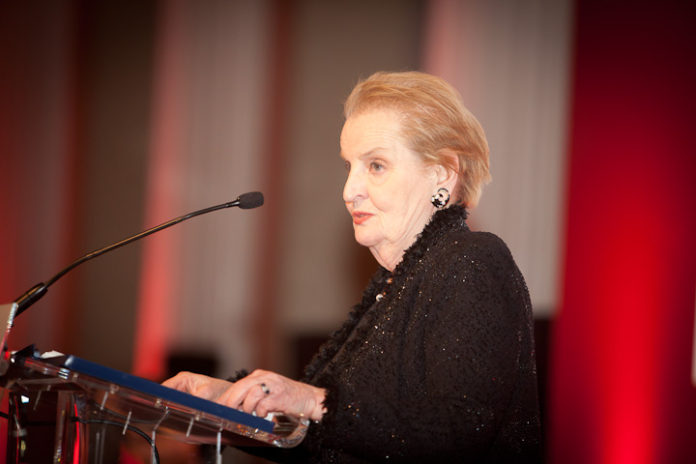Sixteen Transy students joined a conference call with former Secretary of State Madeleine Albright last Wednesday.
The conference call was organized by an outreach program of the Council on Foreign Relations, a Washington-based think-tank that hosts weekly calls with universities. Transy students had the opportunity to participate along with other elite institutions around the country.
This week’s topic was the rise of authoritarian nationalism in powerful countries, the subject of Albright’s new book Fascism: A Warning.
Albright knows intimately the consequences of extreme national movements. Born in then-Czechoslovakia (now the Czech Republic) in 1937, she and her family were forced to flee to Britain in 1939, ten days after the Nazis invaded. They then endured the Luftwaffe’s violent air raids on London.
Despite the post-war global effort to end fascism, Albright says we are seeing its rise once again.
She defines fascism as “a division in society where one side has a strong, almost tribal connection with the ruling government and favors that side over the other. Those belonging to the minority group often fear for their lives.”
Albright also noted the desire of nationalists to find a scapegoat for rising inequality, which she says has taken form in anti-immigration movements.
Fascism thrives in times of social, economic, and political chaos. Albright says that certain other factors, like developing technology and communication methods, can cause some people to cling to their ethnic, religious, or geographic identities.
After Albright’s introduction, students had the opportunity to ask her questions. They asked about subjects ranging from the current political climate to her historic trip to North Korea in 2000.
As the hour came to a close, Albright cautioned that democracies are hard to build but easy to lose. “Democracies are fragile institutions, but resilient through change,” she said. She emphasized that a democracy requires citizens to be active, and said that keeps her hopeful.
Albright is optimistic about the rising generation. “My teachers are becoming younger and younger,” she quipped.
But she warns younger generations “not to take democracy for granted,” and exhorts us always to be active within society while listening attentively to others that disagree.
“It’s easy to forget that there are real people with their own perspectives and lived experiences who actually sit in the driver’s seat and make these important decisions,” said Dr. Steve Hess, who organized Transy’s participation on the call. “Having first-person interactions with leaders who are directly engaged in shaping the country’s foreign policy is a rare and extremely valuable opportunity for students interested in international relations.”
Albright was the U.S. Secretary of State from 1997 to 2001 under President Bill Clinton, and the first woman to serve in that role. She is a Director Emerita on the Council on Foreign Relations.
Rebecca Blankenship contributed reporting for this article.



